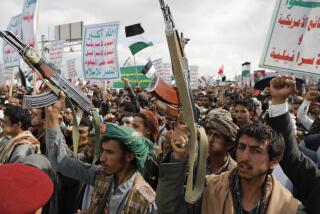Yemeni president flees Houthi-controlled capital, denounces ‘coup’
Reporting from Sana, Yemen — Hours after fleeing house arrest, Yemen’s deposed president on Saturday denounced a “coup” against his authority and issued a direct challenge to the faction now in control of the capital.
The statement from President Abdu Rabu Mansour Hadi injected fresh uncertainty into urgent efforts to prevent Yemen from breaking up or sliding into civil conflict. It was the latest twist of events in the crisis enveloping the strategically situated Arab nation of 24 million.
Hours before Hadi’s evening statement, news surfaced that he had fled house arrest in Sana and had arrived in the southern port city of Aden, where he has considerable political support.
Hadi issued his defiant statement from Aden, hub of a secessionist drive that has been gaining momentum since the northern-based Houthi movement seized control of the capital in September and consolidated control in recent weeks. The Houthi takeover has heightened tension between northern and southern Yemen, which merged into a single nation in 1990.
In his statement, Hadi labeled “illegitimate” all government appointments and actions since the Houthi faction overran Sana. The Houthis later placed Hadi and others in his government under house arrest and dissolved parliament.
The ousted president also demanded that the international community take the necessary steps “to defend the political process and reject the coup.” There was no clarification of what specific actions he sought.
Significantly, Hadi said he favored continued dialogue toward political reconciliation and did not back the growing separatist movement in the south. But he said the talks should take place in Aden or Taiz, southern cities not under Houthi control. He also called for the release of other government officials still under house arrest in Sana.
Left unclear was whether Hadi was withdrawing his resignation from the presidency, tendered on Jan. 22 after Houthi forces surrounded the government palace and his residence.
The nation’s parliament never formally accepted his resignation, so Hadi technically remains chief executive. But Saturday’s statement did not include a formal withdrawal of his resignation.
There was no immediate comment Saturday from the ruling Houthi faction, which now has a tight grip on Sana. The group denies that its takeover was a coup and says it remains committed to a democratic transition in Yemen.
Earlier, the Houthis’ leadership said on their Web page that Hadi had been “smuggled” out of Sana. The group accused the ousted president of trying “to drag the nation to collapse in service to the foreign powers.”
Hussein Bukhaiti, a political activist close to the Houthis, dismissed Hadi’s statement in an interview with Qatar-based Al Jazeera News on Saturday.
“We are now talking about a president that is not legitimate,” he said.
Hadi, an ex-general, has the strong backing of the United States and its gulf allies, including Saudi Arabia, Yemen’s northern neighbor. The Houthis are aligned with Iran, a U.S. adversary and fierce rival of Saudi Arabia for regional influence.
Hadi’s departure from the capital further complicates United Nations-brokered efforts to craft a political solution.
“For sure there is a new political reality today in Sana,” Jamal Benomar, the U.N. special envoy to Yemen, said Saturday in an interview here. “President Hadi is in Aden.”
A day earlier, Benomar said negotiations among various political factions had resulted in a “breakthrough” preliminary power-sharing deal that could help put the country on track to a comprehensive political resolution.
The Houthi takeover has brought fear that Yemen -- once touted by President Obama as a success of his counter-terrorism policy — could collapse, fall into civil war or disintegrate into warring regions. The country is home to Al Qaeda in the Arabian Peninsula, considered among the most potent branches of the global terror network.
The Houthis are sworn enemies of Al Qaeda. But they are also foes of Washington and neighboring Saudi Arabia, which views Yemen as part of its sphere of influence.
The Houthis are mostly members of a minority Shiite Muslim sect in a nation whose population is predominantly Sunni Muslim. Some Sunni tribes are reported to be arming against possible Houthi advances to the east and south of Sana.
Despite its mix of Muslim sects, Yemen has not experienced the kind of sectarian bloodletting that has led to carnage in Iraq and Syria. International negotiators say their goal is to avoid that sort of catastrophic scenario here.
“We have been very clear: We feel that the country is on the verge of a civil war, and what we are trying to do is prevent a civil war,” said Benomar, the U.N. envoy. “To do that we have to bring all parties to the table.”
Bulos is a special correspondent.
Follow Patrick J. McDonnell on Twitter: @mcdneville
More to Read
Sign up for Essential California
The most important California stories and recommendations in your inbox every morning.
You may occasionally receive promotional content from the Los Angeles Times.










